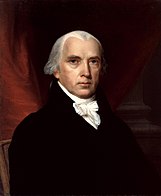United States presidential election, 1812
|
|
|||||||||||||||||||||||||||||||||||||||
|
|||||||||||||||||||||||||||||||||||||||
|
|||||||||||||||||||||||||||||||||||||||
|
|
|||||||||||||||||||||||||||||||||||||||
| Presidential election results map. Green denotes states won by Madison, burnt orange denotes states won by Clinton. Numbers indicate the number of electoral votes allotted to each state. | |||||||||||||||||||||||||||||||||||||||
|
|||||||||||||||||||||||||||||||||||||||
James Madison
Democratic-Republican
James Madison
Democratic-Republican
The United States presidential election of 1812 was the seventh quadrennial presidential election. It was held from Friday, October 30 to Wednesday, December 2, 1812, and took place in the shadow of the War of 1812. It featured an intriguing competition between incumbent Democratic-Republican President James Madison and a dissident Democratic-Republican, DeWitt Clinton, nephew of Madison's late Vice President, George Clinton. The Federalist opposition threw their support behind Clinton. Nonetheless, Madison was re-elected with 50.4 percent of the popular vote to his opponent's 47.6%, making the 1812 election the closest election up to that point for the popular vote. This was the first presidential election to be held during a major war involving the United States.
Residual military conflict resulting from the Napoleonic Wars in Europe had been steadily worsening throughout James Madison's first term, with the British and the French both ignoring the neutrality rights of the United States at sea by seizing American ships and looking for supposed British deserters in a practice known as impressment. The British provided additional provocations by impressing American seamen, maintaining forts within United States territory in the Northwest, and supporting American Indians at war with the United States in both the Northwest and Southwest.
...
Wikipedia



